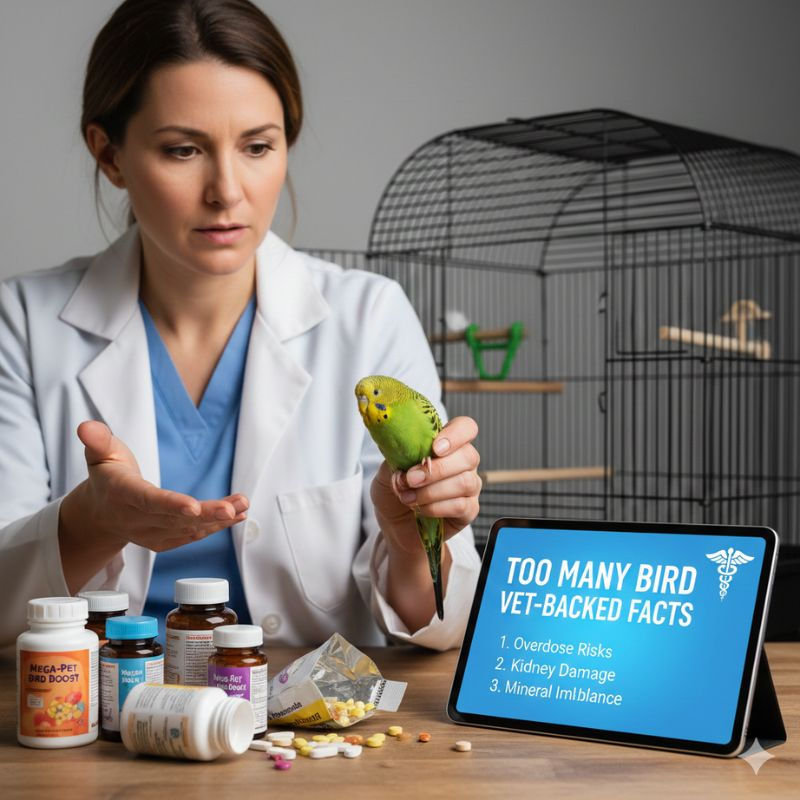Bird-Safe Cleaning Solutions: What to Use and What to Avoid
- petperchlove
- Mar 7, 2025
- 3 min read

Introduction
Keeping your bird’s habitat clean is crucial for their health and well-being. However, not all cleaning products are safe for birds. Many household cleaners contain toxic chemicals that can harm your feathered friends. This guide will help you understand which cleaning solutions are safe, what to avoid, and how to effectively maintain a hygienic bird cage using the right products, such as a high-quality bird cage cleaner and the best pet odor eliminator.
Why Bird-Safe Cleaning Matters
Birds have highly sensitive respiratory systems, making them particularly vulnerable to airborne toxins. Chemicals found in traditional household cleaners can cause severe health issues, including respiratory distress, skin irritation, and even poisoning. Using bird-safe cleaning solutions not only ensures your pet’s safety but also provides a non-toxic environment that supports their longevity and well-being.
Bird-Safe Cleaning Solutions
When selecting a bird cage cleaner, it’s important to choose non-toxic, natural, and pet-friendly products. Below are some safe and effective cleaning solutions:
1. Vinegar and Water Solution
A 50/50 mix of distilled white vinegar and water is an excellent natural disinfectant.
It effectively removes grime, bacteria, and odors without harming birds.
Ensure proper ventilation when using vinegar, as birds have sensitive noses.
2. Baking Soda Paste
Baking soda is a great non-toxic scrubbing agent that helps remove tough stains.
Mix baking soda with water to create a paste and use it for deep cleaning.
3. Bird-Safe Commercial Cleaners
Many pet supply brands, including Kwik Pets, offer specialized bird cage cleaners that are free from harmful chemicals.
Look for enzyme-based cleaners that break down organic matter safely.
4. Steam Cleaning
Steam cleaning is a chemical-free method that kills bacteria and sanitizes surfaces.
Ensure the cage is completely dry before placing your bird back inside.
5. Activated Charcoal for Odor Control
Activated charcoal is a natural way to absorb odors and maintain freshness.
It works well when placed near the bird cage in an open container.
Harmful Cleaning Agents to Avoid
Certain cleaning agents can be deadly to birds. Here’s what to avoid:
1. Bleach and Ammonia
These chemicals produce toxic fumes that can cause respiratory issues in birds.
Even diluted bleach solutions can be harmful if not thoroughly rinsed.
2. Phenol-Based Disinfectants
Found in many household disinfectants, phenols can be toxic to birds if inhaled or ingested.
3. Air Fresheners and Essential Oils
Many air fresheners contain volatile organic compounds (VOCs) that can be dangerous for birds.
Essential oils, particularly those like tea tree, eucalyptus, and peppermint, can be toxic.
4. Alcohol-Based Cleaners
Isopropyl alcohol evaporates quickly but can still release fumes that irritate a bird’s respiratory system.
5. Strong Detergents and Soap
Many dish soaps and detergents contain chemicals that leave harmful residues.
Always opt for fragrance-free, natural soaps if necessary.
Best Practices for Cleaning a Bird Cage
Daily Cleaning Routine:
Remove food scraps and droppings daily.
Wipe surfaces with a bird-safe cleaner or water.
Weekly Deep Cleaning:
Wash perches, toys, and food bowls with a bird cage cleaner.
Replace cage liners or substrate.
Monthly Deep Sanitation:
Use steam cleaning or an enzyme-based best pet odor eliminator to remove tough stains and odors.
Allow all cleaned parts to dry thoroughly before reassembling the cage.
Final Thoughts
Keeping your bird’s environment clean is essential for their health, but it’s equally important to use safe and non-toxic cleaning solutions. By opting for natural remedies like vinegar and baking soda or trusted brands like Kwik Pets, you can ensure your feathered companion stays in a hygienic and healthy habitat. Avoid harmful chemicals, establish a regular cleaning routine, and invest in a reliable bird cage cleaner to maintain a fresh and safe space for your bird.
FAQs
1. Can I use baby wipes to clean my bird’s cage?
Most baby wipes contain fragrances and preservatives that may not be bird-safe. It’s better to use unscented, pet-safe wipes or a damp cloth with a mild cleaner.
2. How often should I clean my bird’s cage?
Daily spot cleaning is necessary, while a thorough cleaning should be done weekly. A deep sanitation process should be performed once a month.
3. Is dish soap safe for cleaning a bird’s cage?
Mild, fragrance-free dish soap can be used in small amounts, but all surfaces must be thoroughly rinsed to remove any residue.
4. What is the best way to remove odors from a bird cage?
Using a best pet odor eliminator that is enzyme-based and bird-safe is the most effective method. Natural alternatives like activated charcoal can also help.
5. Are commercial bird cage cleaners safe?
Yes, as long as they are labeled bird-safe. Brands like Kwik Pets offer specialized cleaning products designed for pet safety.



Comments